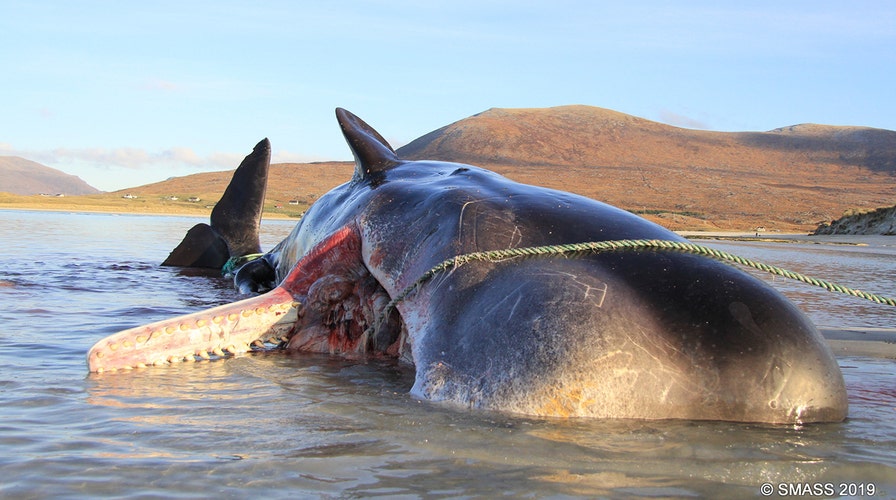Fox News Flash top headlines for Dec. 2
Fox News Flash top headlines for Dec. 2 are here. Check out what's clicking on Foxnews.com
A sperm whale that stranded and died on the shores of an island in Scotland “exploded” when the mammal was opened up for a necropsy. But what researchers found inside was even more surprising: a 220-pound ball of trash inside its stomach.
The male juvenile whale was discovered Nov. 28 on the Isle of Harris in the Outer Hebrides, the Scottish Marine Animal Stranding Scheme (SMASS) wrote on Facebook. It said researchers from the group weren’t able to reach the whale until 48 hours later.
THAILAND DEER DIES AFTER EATING 15 POUNDS OF GARBAGE DUMPED BY HUMANS
The group posted a “briefly alarming” video that showed the whale’s guts blowing out its side after researchers cut into the sea creature for a necropsy.
Whales are well insulated because of their size, allowing their bodies to remain warm in near-freezing temperatures and decompose very quickly, the group said. This sometimes leads to their carcasses “exploding.”
But the giant ball was what really shocked the researchers.
Wrapped in a giant ball was various marine debris, including sections of netting, bundles of rope, plastic cups, bags, gloves, packing straps and tubing that came to weigh about 220 pounds, the group said. The SMASS shared graphic photos of the discovery on its Facebook page.

A sperm whale that stranded and died on the shores of an island in Scotland had a 220-pound ball of trash inside its stomach. (Scottish Marine Animal Stranding Scheme)
The animal didn’t appear to be in poor condition, the SMASS said. While it was possible that the garbage ball factored into the whale’s live stranding, the group said it couldn’t find evidence it had obstructed its intestines.
A BLUE WHALE HAD HIS HEARTBEAT TAKEN FOR THE FIRST TIME EVER -- AND SCIENTISTS ARE SHOCKED
“This amount of plastic in the stomach is nonetheless horrific, must have compromised digestion, and serves to demonstrate, yet again, the hazards that marine litter and lost or discarded fishing gear can cause to marine life.”
The organization said that the trash came from “both the land and fishing sectors” and could have been consumed anywhere between Norway and the Azores, located in the mid-Atlantic Ocean west of Portugal.
Unable to move the 20-ton mammal elsewhere, officials buried it at the beach, SMASS said.
The group said they would continue to investigate why the sea creature had so much debris in its stomach.









































